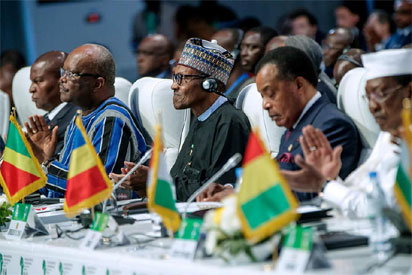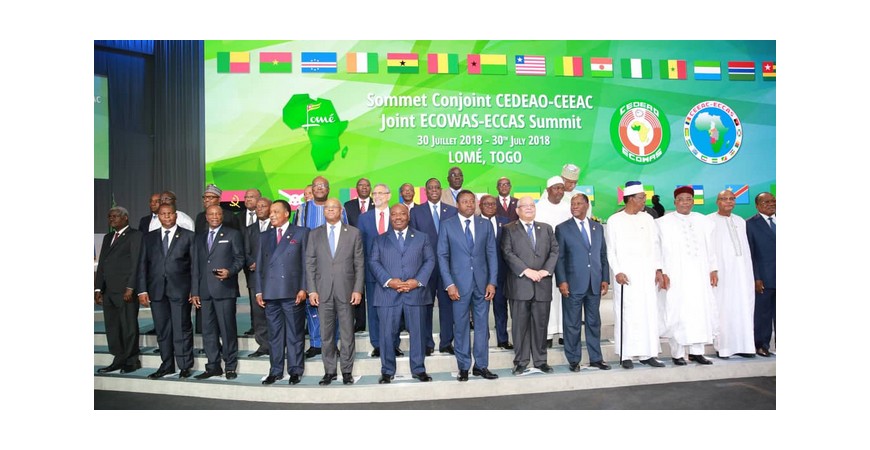Togo’s President Faure Gnassingbe hosts summit on security issues
BY MODUPE ABIOLA
The president of Togo, Faure Gnassingbe, hosted his peers from West and Central Africa yesterday for a one-day summit meeting in Lome, the capital of the small West African nation, to devise a common approach to fighting terrorism and extreme violence in their respective regions. The mega meeting that brought more than twenty African heads of state from the two regions was held under the umbrella of the 15-member-state-strong Economic Community of West African States (ECOWAS), and the 11-member-state-strong Economic Community of Central African States (ECCAS).
The heads of state’s meeting, which followed the ministerial-level meeting of officials from the two regional communities held on July 28, focused on ways to combat terrorism by devising new mechanisms, or honing existing ones, aimed at stopping illegal cross-border activities, money laundering, drugs and arms trafficking, among other evils that hinder peace and security and stand in the way of economic development in the two African regions.
“The Joint Summit calls upon member-states, African Union, United Nations, bilateral and multilateral partners and the entire international community to support the implementation of the decisions thus adopted.”
The meeting was crowned by a communique titled “The Lome Declaration on Peace, Stability, Security and the Fight Against terrorism,” which affirms the leaders’ commitment to “strengthening their efforts on a shared vision to meet the threats of terrorism.” One major outcome of the gathering is the creation, by the end of 2020, of a “criminal police” that will operate between the two communities, and the institution of an early-warning and quick-response mechanism involving the civil society in both regions.
 The attendance of more than twenty heads of state from West Africa and Central Africa underscores the significance of the meeting, and, arguably, stands as a personal success for the Togolese president. It is worth noting that since the end of the era of the Organization of African Unity whose annual conferences of heads of state were used by some of the leaders as a pageant in the sixties, seventies and eighties, African heads of state rarely meet in such large numbers in the same place these days.
The attendance of more than twenty heads of state from West Africa and Central Africa underscores the significance of the meeting, and, arguably, stands as a personal success for the Togolese president. It is worth noting that since the end of the era of the Organization of African Unity whose annual conferences of heads of state were used by some of the leaders as a pageant in the sixties, seventies and eighties, African heads of state rarely meet in such large numbers in the same place these days.
Also worth noting is the rare nature of this joint meeting of two African regional organizations, which led to the meeting being co-chaired by President Faure Gnassingbe of Togo, chairman of ECOWAS, and his peer of Gabon, Ali Bongo Ondimba, chairman of ECCAS.
Owing to the global concern of the security threat, the meeting was also attended by representatives of the United Nations, alongside delegates of the continent-wide African Union, and those of sub-regional organizations including the Lake Chad Basin Commission (LCBC), the G5 Sahel, the Commission of the West African Economic and Monetary Union (UEMOA), the Economic and Monetary Community of Central Africa (CEMAC) and the Gulf of Guinea Commission.
The just-concluded meeting built on one held earlier by the regions’ leaders in Yaounde, Cameroon, on 25 June 2013. This earlier gathering, which resulted in the so-called “Yaounde Process,” led to the adoption of the Declaration on Maritime Safety and Security in the Gulf of Guinea—a set of legal and political measures to meet the formidable, growing security threats.
The heads of state have now committed themselves to meeting on an annual basis on the occasion of the annual summit meeting of the African Union, and every two years in different capital cities of their respective communal organizations. The next summit meeting will be held in Ndjamena, the capital of Chad, in 2020.
The Economic Community of Central African States comprises 11 member-states: Angola, Burundi, Cameroon, Central Africa, Congo, Democratic Republic of Congo, Equatorial Guinea, Chad, Sao Tome and Principe and Rwanda. The Economic Community of West African States comprises the following 15 countries: Benin, Burkina Faso, Cabo Verde, Cote d’Ivoire, Gambia, Ghana, Guinea, Guinea Bissau, Liberia, Mali, Niger, Nigeria, Sierra Leone, Senegal and Togo.



